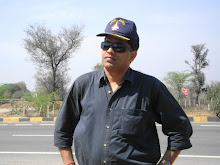It has been nearly two months since I wrote on the BJP's existential dilemma (posted on Aug 18, '09) soon after Jaswant Singh's controversial book on Mohammad Ali Jinnah hit the stands. The party has since expelled the veteran leader. I had attributed the BJP's current state of decline to not only a succession battle among the second-rung leaders as they stare at the post Vajpayee-Advani era but its very ideological foundation of Hindutva. I had argued that any brand of exclusivist politics is bound to fail to garner a pan-Indian appeal as the country's political space and culture is inherently centrist in nature. It can tolerate a marginal deviation from the centre on either side but not beyond. Appealing to communal sentiments (be it religious or linguistic) can get some limited temporary electoral gains, but will never broaden any party's base.
Keeping this in mind, I had done my own tabletop projections for the Lok Sabha polls much before the first vote was cast and it was not a surprise that I was close to the final outcome.
A couple of weeks back, it was heartening to read an article by Lloyd Rudolf and Susanne Rudolf in The Economic and Political Weekly in reply to Zoya Hassan's review of their latest book- 'Explaining Indian Democracy'. Rudolf and Rudolf, whose 1987 book 'In Pursuit of Lakshmi' analysed the nature of the Indian state, have taken the thesis a bit forward in their latest book and concluded that Indian state is centrist in nature while explaining the BJP's conclusive defeat in the 2009 parliamentary polls. In fact, looking beyond politics, they argue that the Indian economy is also centrist in nature despite the heavy dose of liberalisation that has unfolded since 1991. The only difference is that from a command and control (Licence Raj) economy, we have moved to a regulated economy rather than going to the extreme of embracing 'free market' (free for all) like the US. This, perhaps, helped India remain substantially insulated from the trend of collapsing financial institutions and absorb the global meltdown better.
The decline of the Congress in the last two decades had much less to do with the apparent expansion of the BJP, but more to the rise of forces like Mayawati, Mulayam Singh Yadav and Lalu Prasad. Together these parties managed to corner the support of the minorities, backward castes and Dalits, wiping off the Congress from UP and Bihar which account for a substantial chunk of parliamentary seats. Verdict 2009 witnessed signs of Congress revival in these two crucial states in the Hindi heartland. Rahul Gandhi's periodic visits to Dalit families in UP seems to be part of a long-term grand strategy of India's grand old party.
What applies to the BJP also applies to the Left. The sooner the comrades realise and move towards a 'New Left' philosophy (not going too far to the left of the centre), the better it will be for their political future. Interacting with a few comrades weeks after the announcement of the parliamentary results, I was surprised that most claimed that the people had committed a mistake instead of analysing where the Left parties faltered.
Like the BJP, the Left parties also seem to be in a denial mode. Both have failed to analyse the mindset of the rising middle class. This aspirational class, even at the lowest levels, is not bothered anymore about the Ram Temple or aggressive trade unionism. For a vast majority, trade unions have outlived their utility as the battle for minimum wages is long over and in the face of huge opportunities in the private sector and for self-employment.
In a few days, we will know the verdict of the people in three states of which the focus is on Maharashtra and Haryana. In Maharashtra, the Thackerays, particularly Raj Thackeray, pandered to the anachronistc regional sentiments (Marathi pride), perhaps forgetting that the migrants' votes tilted the scales against the Shiv Sena and in favour of the Congress-NCP combine in the last elections. This time, it could be worse with the Thackeray family split in the middle.
One more word about the nature of politics in Maharashtra. Unike elsewhere, political leaders at the local level in the state are far more powerful, courtesy the cooperative movement (sugar coopertives etc) that gives them a personal clout, reducing their dependence on the party. That explains why Maharashtra gets maximum number of rebels across parties as contestants. Local leaders don't shy away from defying the party when denied ticket. In a state where 145 is the magic number, more than 115 rebels this time are said to have the potential to have a bearing on the poll outcome in their constituencies.
In less than two weeks, we will know the verdict. It will be interesting to know what the people of the one of the high-growth states in the Indian Union have voted for.
Sunday, October 11, 2009
Subscribe to:
Post Comments (Atom)




In the absence of a credible opposition the Cong will probably end up winning. Though its governance of the state in the last 10 years leaves much to be desired. There is some visible changes that the Dixit govt has brought in Delhi. Can't say the same for the Cong in Maharashtra. All you can recall of their performace is infrastructure woes and farmer suicides.
ReplyDeleteCompletely agree. That's my fear. We are heading for some kind of a Congress system seen in the initial decades after Independence, marked by complete lack of opposition, so crucial for a democracy.
ReplyDelete